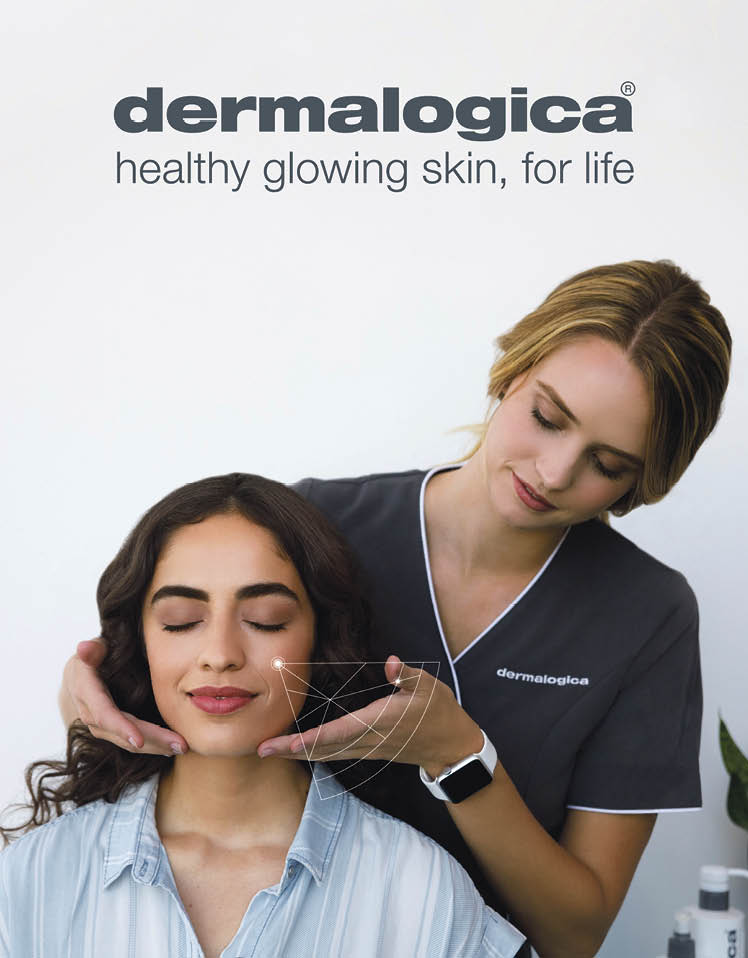Our skin defends our body against a whole range of environmental attacks. It helps get rid of toxins and it continually renews itself. So why do we treat its care as a cosmetic issue and not a health issue?
Though, of course, a certain amount of our skin’s behaviour is predetermined, day-to-day changes can affect our skin more than you think and recognising that your skin is ever-changing is crucial in developing a skincare routine that really works for you.
Dermalogica’s core belief is that education is key to understanding skin. It educates its therapists so they can pass the knowledge on to the customer to make an informed decision. “Our product is sold by professional skin therapists, people who truly understand skin histology and how ingredients affect your skin and, crucially, how your lifestyle affects your skin,” Dermalogica’s education director Sally Penford explains.
Dermalogica’s Face Mapping® allows the customer to build a picture of what’s going on with their skin past, present and future. A Dermalogica professional skin therapist uses Face Mapping to assess every area of the facial landscape. Through touch and sight they may ascertain conditions such as congestion, breakouts, sensitivity, dehydration, and/or hyperpigmentation.

By looking under a magnifying lamp and observing skin up close, alongside asking you about your lifestyle, Dermalogica therapists will be able to advise on factors such as pollution, hormonal changes or product usage and how they’re affecting your skin.
For example, a lot of make-up contains artificial colour such as D&C reds that can cause blackheads. Central heating and air conditioning can cause dehydration and contribute to crepe-like texture on the skin.
“We play detective really,” Ms Penford says. “You might, for example, be affected by seasonal changes. When winter comes you may spend more time indoors with the central heating on or you might play lots of sport outside in the cold.” This in turn affects what products you need to use and when, such as a light foaming cleansing wash in summer or a winter barrier cream.
Face Mapping is a crucial part of Dermalogica’s dedication to education. “We really want every individual to be empowered with knowledge about their skin to make informed choices about the products they use,” says Ms Penford. “You might look at your face, but not realise what it’s telling you. By knowing things like, for example, being pregnant can affect the skin’s pigmentation, you can find the right product solutions at the right time.”
Personalising your skincare regime doesn’t mean that having a core basic routine is a bad thing. “A skin therapist will get you on a good solid daily regime that fits your overall skin type and your lifestyle,” says Ms Penford. “But the interesting part is knowing what your skin needs each day when you look in the mirror. This is where you can decide whether your skin needs a targeted product such as a serum, exfoliant or mask. It’s about having a collection of key problem-solving products on hand to respond to what your skin needs that day.”
We produce products that work
These problem-solving products are a result of years of careful research. Dermalogica’s products are created in response to real consumer needs without being slave to the latest fads. “We produce products that work,” says Mr Penford, simply. The outcomes are based on clinical studies and the work of thousands of therapists using Dermalogica products around the world every day, rather than the result of a marketing strategy or knee-jerk reaction to trends.
To this end, Dermalogica works at the cutting edge of skin technology, working on innovative ways constantly to transform its products. Dermalogica’s vision is for skin health over beauty and its products, free from common irritants and ingredients that can cause breakouts, reflect this. Dermalogica products are researched and developed by the International Dermal Institute, which provides postgraduate education in skin therapy. This dedication to the science is also reflected in the no-nonsense branding, which focuses on results and not how pretty the bottle might look on your bathroom shelf.
Having a trusted relationship with a skin therapist means you are able to consult them when you have questions about your skin’s changes or you need a more intensive treatment. For example, if you need dramatic results fast, Dermalogica’s ProSkin 30 treatment will target your key skin goals from pigmentation and scarring to uneven skin tone or acne, in just 30 minutes. In 60 minutes your skin therapist can take you and your skin on the ultimate treatment experience.
Developing a good skincare routine comes back to knowing that your skin is an ever-changing story. What works for you now might be completely different in three months’ or a year’s time and what your skin needs might not be what you think it needs. Knowing who to turn to for these answers is the first step.
For more information please visit www.dermalogica.co.uk

